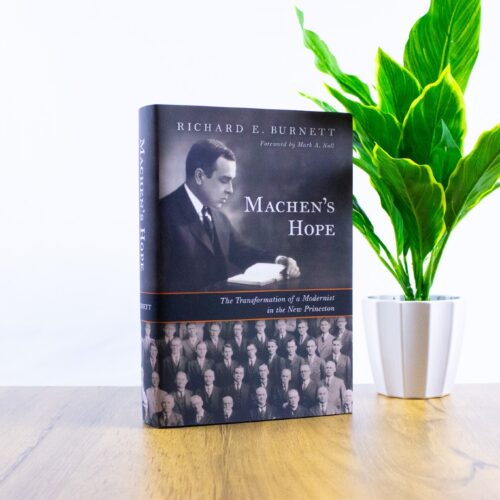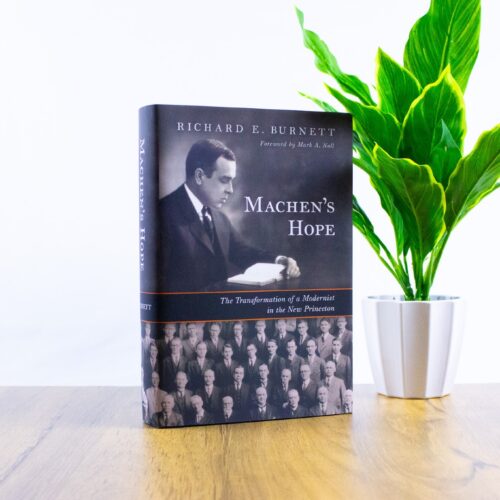
MACHEN’S HOPE: The Transformation of a Modernist in the New Princeton. By Richard E. Burnett. Foreword by Mark A. Noll. Grand Rapids, MI: Wm. B. Eerdmans Publishing Company, 2024. Xviii + 619 pages.
I first encountered the name J. Gresham Machen in college. Although I didn’t take Greek in college, my friends in the first-year Greek class used his grammar. When I got to seminary, I learned more about the author of that Greek textbook used at the college in Jack Rogers’ Philosophical Theology class. At the time Fuller Theological Seminary was under attack from the right because it abandoned biblical inerrancy for biblical infallibility. Dr. Rogers had recently written a response to the critics, including a founding member of the Fuller faculty by the name of Harold Lindsell, suggesting that the idea of inerrancy was a rather new concept. That response was found in the book Rogers wrote with Donald McKim that carried the title The Authority and Interpretation of the Bible: An Historical Approach. Machen appeared in that book along with other representatives of old Princeton such as B.B. Warfield and Charles Hodge. Machen also appeared in George Marsden’s important book on fundamentalism. The Machen that appeared in those books was the archconservative theologian who broke with Princeton Seminary and the Northern Presbyterian Church. My understanding of Machen is that he was an arch-conservative defender of biblical inerrancy who broke both with Princeton Seminary and the Northern Presbyterian Church. As is often true in life, the story of Machen’s life is more complicated than what I had understood.

Robert D. Cornwall
My conservative evangelical days are well in the past. Interestingly, one of the contributions to my evolving faith was that class taught by Jack Rogers. While I knew the name and something of his story, I never read any of Machen’s books, including perhaps the most influential of all of them: Christianity and Liberalism (1923). That book was a major contributor to the emergent modernist-fundamentalist crisis of the era that led to divisions in the major denominations over questions of biblical authority, virgin birth, and other matters. While fundamentalists sought to claim him as one of their own, he tended to shy away from identifying too closely with them because of a perceived anti-intellectualism among that group. Nevertheless, he contributed to the controversy. The question raised by this biography of Machen is whether he had always been an anti-modernist. The answer to that question, as we see in reading Richard Burnett’s biography Machen’s Hope, is that earlier in life he had leaned in a modernist direction.
The author of Machen’s Hope, Richard Burnett, is a Presbyterian (PCUSA) minister, editor, and the director of the MA program in Reformed Theology at the University of Dubuque Theological Seminary (a PCUSA-aligned seminary). In Machen’s Hope Burnett offers us a magisterial biography of Machen that focuses on his transformation from someone who embraced the modern idea of the university represented by Johns Hopkins, the first modern university in the nation, a university that followed a more German university model. After his education at Johns Hopkins University in his hometown of Baltimore, he headed to the Presbyterian-aligned Princeton University, where he studied New Testament at the seminary, where BB Warfield still held court, as well as an MA in philosophy at the University itself. At the time he went to Princeton, it was beginning to follow the lead of Johns Hopkins and other similar universities in the United States that sought to become more scientifically focused. After his time at Princeton, he spent two semesters in Germany, first at Göttingen and then at Marburg, studying with leading German scholars such as Wilhelm Herrmann and Adolf Jülicher. He was greatly impressed with the German academic world and wanted to see it replicated back home. Then when Woodrow Wilson became President of Princeton University, he supported Wilson’s attempt to modernize the university along the lines of Johns Hopkins. He wasn’t necessarily a liberal (politically and culturally he was libertarian with a Southern edge), but he was committed to creating a system of higher education in the States that was scientifically oriented. While he hoped to pursue doctoral studies in Germany in New Testament, those dreams never came to fruition. Instead, he joined the faculty of the Princeton Seminary, first as an instructor in Greek and later as a professor of New Testament. During his early years at Princeton, he sought to raise the educational standards of the seminary, which he felt were substandard, such that they might better reflect the scientific mindset he had encountered first at Johns Hopkins and then in Germany.
In those early years, although he grew up in a culturally conservative family, he highly valued education. He read voraciously and embraced the scientific mindset, even in his theology. Nevertheless, over time, Machen began to abandon that modernist impulse, moving toward his later embrace of an antimodernist theology. In this biography, which is based largely on letters that Machen wrote to colleagues, friends, and especially to his mother, Burnet focuses on Machen’s early years rather than the closing years of his life, after Machen left Princeton and founded Westminster Theological Seminary along the lines of the old Princeton of Warfield, and the Presbyterian Church for a new Orthodox Presbyterian Church, which he helped found. While he moved ultimately to an antimodernist position, he eschewed the fundamentalist label, though fundamentalists sought his support. The reason he rejected that label, even as he moved to an anti-modernist position, is that he found the fundamentalists to be too anti-intellectual for his taste. So, we see a continuance of that desire for a high level of intellectual engagement even as he abandoned his earlier positions.
Burnet helpfully lays out Machen’s struggle with his faith, as he sought to balance his commitment to strong intellectual foundations with a more conservative theological heritage. We learn that Machen’s roots, especially through his mother, were in the Deep South. This includes racism. Politically, although he supported Wilson, who was a family friend, when he ran for the Presidency, he was quite libertarian in his views. He favored limited government, believing that the government should have as little involvement as possible in daily life. Ultimately, what we encounter here is a very complicated person who sought to apply to theology and the study of the Bible all the tools of science, together with an ongoing commitment to supernaturalism. It was this commitment to supernaturalism that put him at odds with other modernist theologians, a commitment that ultimately led to his embrace of anti-modernism. Thus, finding resistance to his perspectives on theology, including his defense of the virgin birth and his major study of Paul’s theology, he moved toward a break with more mainstream Presbyterianism at Princeton and elsewhere.
Burnet titles the biography Machen’s Hope to highlight Machen’s hope that the establishment of a strong scientifically based university education, along the lines of Johns Hopkins, at the seminary could encourage intellectual excellence in the field of theology. But what he discovered was that his pursuit of intellectual excellence ran aground on the emergence of a much more secular vision of education than he was willing to embrace. Thus, in the end, he traded his original vision of a strong university version of Christian scholarship for one rooted in the Old Princeton he had originally rejected. It was that version of scholarship represented by Old Princeton, the Princeton of Hodge and Warfield, that he once sought to jettison that he sought to reclaim when he helped found Westminster Theological Seminary. As Burnet writes, in these later years “There was no more talk about university ideals. The hope he once had in the ideals of the New Princeton had been crucified, dead, and buried. Now he hoped for the resurrection of a new, transfigured form of the Old Princeton” (p. 568).
One might ask why we might need a new biography of J. Gresham Machen, especially if like me you are not part of a conservative Reformed tradition. It’s a good question. One thing I’ve found reading biographies of theological leaders whether Bonhoeffer, Barth, Brueggemann, or in this case Machen, is that context matters. When we read biographies such as this one, we discover how the choices we make in life impact the direction our journeys take. Thus, as I read this well-written biography, I kept wondering how Machen’s decision not to pursue doctoral studies in Germany impacted his journey. He had an affinity for Germany. He made friends there and respected the teachers he studied with during that brief time in Germany, including Wilhelm Herrmann (one of Karl Barth’s teachers at Göttingen) and Adolph Jülicher (one of Rudolph Bultmann’s teachers at Marburg). How might his life story have changed had he gone that route? We can’t know the answer to that question, but it is worth contemplating. Ultimately, Machen’s commitment to intellectual excellence came into conflict with theological positions, such as the defense of the virgin birth of Christ, that conflicted with mainstream biblical scholarship that sought to set aside the supernaturalism Machen embraced. We see in Machen a move from an embrace of scientific standards of biblical study to one guided by theology. As the study of “religion” emerged in university settings, as opposed to the study of the Bible, he came to believe that theology “was not to be measured by the standards of religion, but religion was to be measured by the standards of theology” (p. 579). This was a major change because he had always believed that science not theology should guide the interpretation of the Bible.
While I might not embrace Machen’s theology, I found Burnett’s biography Machen’s Hope to be both magisterial and insightful. He helps us better understand this somewhat enigmatic but influential figure whose influence continues to this day in the seminary he helped found and the Orthodox Presbyterian Church that he also helped found. In addition, his Greek grammar continues to be used to this day, even by students who might not share his theology. While conservative Christians of a Reformed bent might still embrace his views, those of us who do not share his views may find this a helpful introduction to a person whose own spiritual journey took a turn different from one’s own. Therefore, I recommend that even liberal/progressive Christians (people like me) might benefit from reading Richard Burnett’s in-depth study of an important figure in American religious history.
This review originally appeared on BobCornwall.com.
Robert D. Cornwall is an ordained minister in the Christian Church (Disciples of Christ). Now retired from his ministry at Central Woodward Christian Church (Disciples of Christ) of Troy, Michigan, he serves as Minister-at-Large in Troy. He holds a Ph.D. in Historical Theology from Fuller Theological Seminary and is the author of numerous books including his latest “Second Thoughts about the Second Coming: Understanding the End Times, Our Future, and Christian Hope” coauthored with Ronald J. Allen. His blog Ponderings on a Faith Journey can be found at www.bobcornwall.com.

